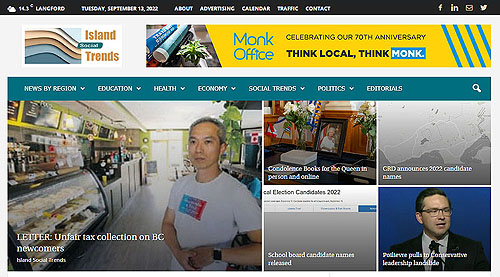Tuesday September 13, 2022 | DUNCAN, BC
by Mary P Brooke, B.Sc. | Island Social Trends
As families are grappling with inflation during the back to school season, local MP Alistair MacGregor (Cowichan-Malahat-Langford) and his NDP Caucus colleagues are reminding Canadians how that political party’s 25 MLAs have used their power in this minority 44th Parliament to help families.
Family budgets have been boosted with things like giving families $650 a year, per child under age 12 for dental work. When getting into the nuts and bolts of it, the funds will actually go to the dentists in cases where families don’t have dental insurance to cover the cost of dental work done. But it achieves the goal of improved health care for families who would not otherwise have the resources to get dental work done for their kids.
The Canadian Dental Association (CDA) says that parents have a big role to play in keeping their children’s teeth healthy and clean toward helping prevent cavities. “Prevention starts at home, with good eating habits and daily cleaning of the teeth,” says the CDA, which offers some teaching resources about children’s dental care online.
Other income achievements by the NDP:

The NDP says they have also forced the Liberals to put money in people’s pockets with $500 to help pay rent through the federal housing benefit and up to $467 with a doubling of the GST benefit to help pay bills.
This type of political pressure is similar to what the NDP achieved for Canadians with the CERB payments during the COVID pandemic in 2020 and 2021, as in forcing the Liberal government to provide the program and then to see it be at a suitable amount that would actually achieve the goal of providing stability to individuals and families at a time of financial and socioeconomic unknowns.
Inflation forces choices:
“High inflation has forced families to make the heart-breaking choice between paying for dental care for their kids or paying their bills,” said MacGregor.
“The rising costs of housing, groceries, and gas for families – while big companies and the super-rich make billions off them in profits – is stretching family budgets even more. Families are playing by the rules, doing everything right, but they still can’t get ahead.”
Even before the record-high inflation of 2022, many families for years have been experiencing a decline in their economic status. The ‘affordability’ buzz word became popularized in BC several years ago, after MLA John Horgan (even before he was premier) was hearing about these challenges from among his constituents.
As recently as last year, the Liberals and Conservatives voted together against dental care for working families. Today’s announcement highlighted the constructive role New Democrats are playing by forcing the Liberals to deliver real help for Canadians who are struggling.
Generational change:
“The roll-out of this dental care program over the next few years will be a generational change to our healthcare system and will help millions of Canadians get care for their teeth for free,” said MacGregor.
People who have stable incomes and resources may not realize the life-impacts of not having a healthy mouth or a presentable smile. Impacts include social activity, employment opportunities, and the down time and expense for dealing with health problems related to poor mouth hygiene and dental care.
NDP stands up for health care:
“New Democrats have fought and won important victories that have benefited Canadians – like Medicare,” says MacGregor. The NDP pushed for universal health care back in the 1960s, working with a minority Liberal government at the time.
“We are carrying on this fight so families can finally get dental care for their kids and get help with their struggling budgets,” the Vancouver Island MP said in a news release today.
Backgrounder:
Dental care and Canada Housing Benefit promises of the Confidence and Supply Agreement:
• New dental care program for low-income Canadians: Starts with under 12-year-olds in 2022, then expands to under 18- year-olds, seniors and persons living with a disability in 2023, then full implementation by 2025. Program would be restricted to families with an income of less than $90,000 annually, with no copays for anyone under $70,000 annually in income.
• A $500 one-time top-up to Canada Housing Benefit in 2022 which would be renewed in coming years if cost of living challenges remain.







